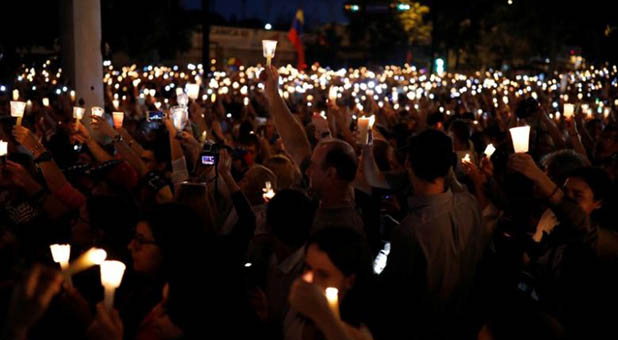Liberty and Collectivism Are Rival Theologies
Liberty and collectivism are not merely competing political systems; at a deeper level, they are rival theologies. Each has its own depiction of God and, with it, differing assessments of human dignity.
Sir Roger Scruton‘s new book, On Human Nature, notes that modern fascism and socialism begin with the premise that mankind is captive, either to its biology or its social circumstances. My review dwelled upon the first, and the racially discriminatory societies that biological determinism produces. But the second is no less misleading.
True, Marxism rooted itself in a misguided reading of science. Its adherents regularly touted the system of “scientific socialism” and its inevitable triumph. Marx and Engels believed the evolutionary process contained an economic component that forecast the arc of every society. Moreover, they fought against any supernatural interpretation of the process.
However, socialism’s most alluring message promotes the morality of helping the least fortunate, decrying inequality, and appealing to spiritually based beliefs in fairness and compassion. Such a message captivated generations of those who believed in the social gospel or who replaced religion with statist ideology altogether.
“Marxism is not a product of scientific observation: it is theological,” Janet Daley, a columnist for the London Telegraph, writes in the April issue of Daniel Hannan’s new publication, The Conservative. “Once you accept the premises, it realigns your perception of the human condition.” (Scruton himself has an article on Communism’s destruction of community, which he calls “the true origin of Communist enslavement,” in the same issue.)
Casual adherents of the social gospel would be shocked when socialism unveiled its true theology, though they should not have been. Marx’s rival in the First International, Mikhail Bakunin, wrote that into the midst of the Garden of Eden “steps in Satan, the eternal rebel, the first freethinker and the emancipator of worlds. He makes man ashamed of his bestial ignorance and obedience; he emancipates him, stamps upon his brow the seal of liberty and humanity.”
Nonetheless, some modern politicians want to give the devil his due—perhaps a bit more.
John McDonnell, the Labor Party’s Shadow Chancellor of the Exchequer, has occasionally confessed, “I am a Marxist.” Earlier this month, shortly after Theresa May called for a snap election, he told the BBC’s Andrew Marr, “I believe there’s a lot to learn from reading Kapital,” Marx’s imposing tome.
As Kristian Niemietz noted, there is also an opportunity cost to reading Das Kapital: namely, giving up the time to read more insightful works. I would add that there’s a lot to learn from reading history, particularly the history of those who read Das Kapital and tried to impose its precepts on society. At about the time McDonnell made his comments, the viral website History Daily produced a list of “the most murderous regimes in the world.” Communists account for five of the top 12; Adolf Hitler came in third.
This is a popular website, not a scholarly publication, and one can argue with its findings. Vladimir Lenin should arguably rank high in the list, given his decision to exploit a famine that killed five million people by allowing many to starve needlessly. And Soviet Communism scores artificially low (if one can call Stalin’s death count “low”), because the author broke down casualties by dictator rather than by nation/system.
At the root of all this destruction lies envy, greed for political power and a disregard for the inherent dignity of every individual created in the image of God.
Pope John Paul II warned in Centesimus Annus that socialism violates “human nature, which is made for freedom.”
“In contrast, from the Christian vision of the human person there necessarily follows a correct picture of society,” he wrote. “The social nature of man is not completely fulfilled in the State, but is realized in various intermediary groups, beginning with the family and including economic, social, political and cultural groups which stem from human nature itself and have their own autonomy, always with a view to the common good.”
Scruton says these things are swallowed up by the state; Pope John Paul II wrote that they are “cancelled out by ‘real socialism.'” The inevitable result of collectivism, the pontiff wrote, “is that the life of society becomes progressively disorganized and goes into decline.”
With or without political repression, socialism cannot work because it violates the innate nature of “man, who was created for freedom.”
If there is wisdom in reading Marx and the history of his followers, there is yet more wisdom in reading the writings of those who prophetically warn society against taking this course in the first place—and those who, observing its wreckage, now strive to restore a proper appreciation of mankind and society, like Roger Scruton. {eoa}
Rev. Ben Johnson is senior editor at the Acton Institute.
This article was originally published at Acton.org. Used with permission.















































